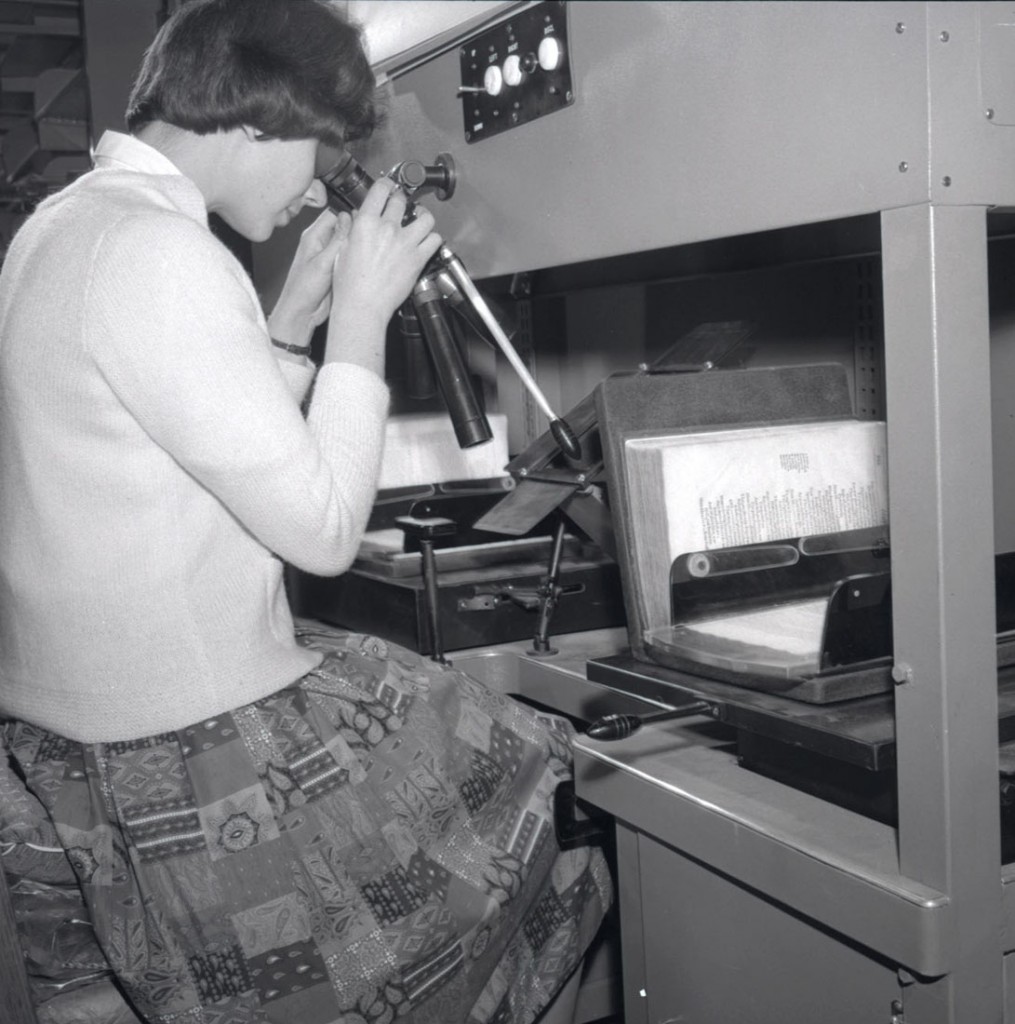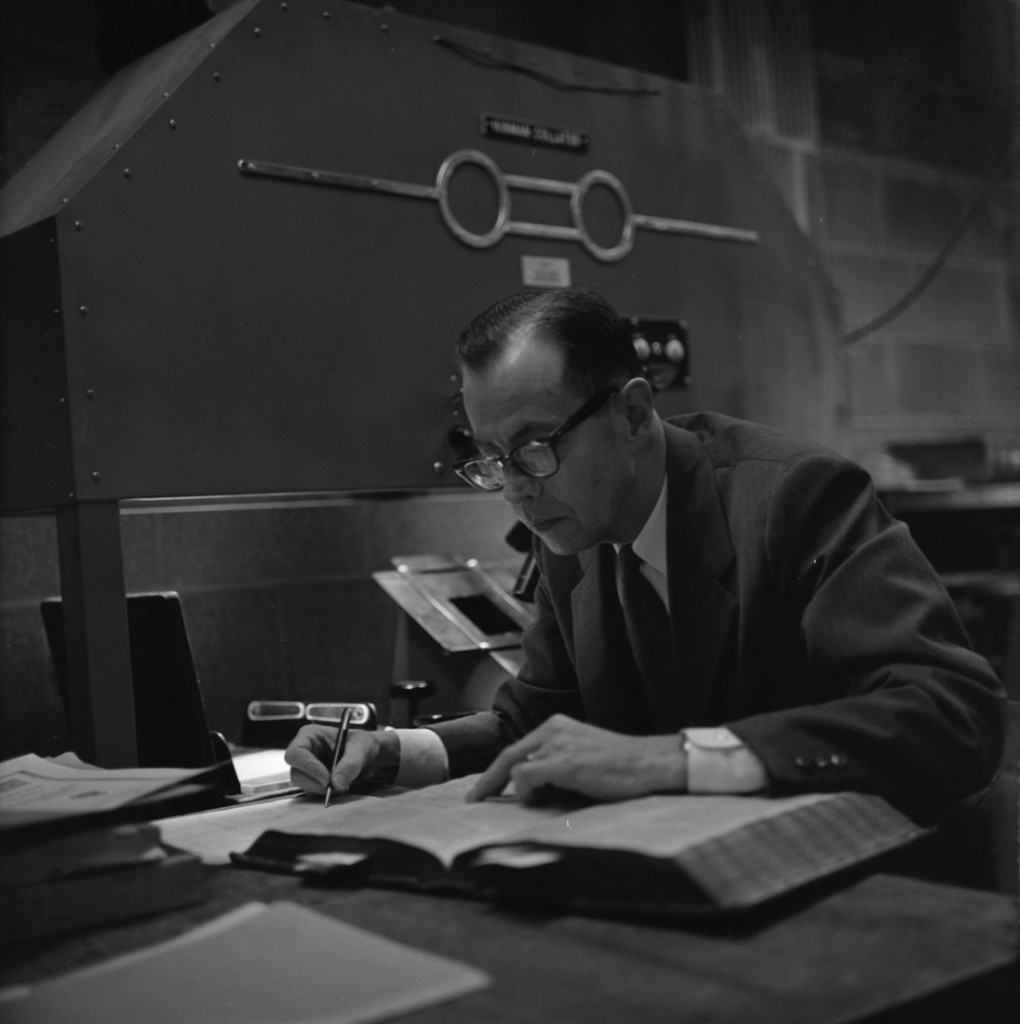Flashback Friday: Hinman Collator Edition
April 15th, 2016Each week we’ll be posting a photograph from University Archives that shows a scene from KU’s past. We’ve also scanned more than 26,900 images from KU’s University Archives and made them available online; be sure to check them out!
This week we’re celebrating National Library Week! First sponsored in 1958, National Library Week is a national observance sponsored by the American Library Association (ALA) and libraries across the country each April. It is a time to celebrate the contributions of our nation’s libraries and librarians and to promote library use and support.
The theme of this year’s National Library Week is “Libraries Transform,” so today’s entry highlights a transformational piece of equipment that can be found in numerous libraries across the country, including Spencer. It’s a Hinman Collator, and it was invented by former KU English professor Charlton Hinman in the late 1940s. The machine was used to compare pairs of documents or books for differences in the text.
Woman using a Hinman Collator at Watson Library, 1959. The machine was moved to
Spencer Research Library sometime after it opened in 1968. University Archives Photos.
Call Number: RG 32/37 1959 Negatives: University of Kansas Libraries:
Special Collections (Photos). Click image to enlarge (redirect to Spencer’s digital collections).
Here’s how the Hinman Collator worked (as described on the blog of the Folger Shakespeare Library): The user placed a book in each of the two holders so that they were aligned when s/he looked through the eyepiece. The Collator then “used strobe lights to rapidly alternate between views of the two pages [i.e. superimposing them], and any differences would jump out at the viewer, seeming to lift off the page.”
One scholar has described the Hinman Collator as “one of the most important applications of technology to the study of literature ever made.” This was because, according the Folger blog, it “rapidly increased the rate at which two texts could be compared. The manual method that preceded Hinman’s mechanical collator consisted of placing one finger on each text and looking back and forth between them…[It] was not only slow, but potentially inaccurate.”
The Collator’s inventor, Charlton Hinman (1911-1977) attended the University of Colorado, Cornell, and Oxford before receiving his Ph.D. in English from the University of Virginia in 1941. He held positions at the University of Missouri (1937-1939) and Johns Hopkins University (1946-1950) before arriving at the University of Kansas in 1960; he taught at KU until he retired in 1975. Hinman’s areas of specialization included Shakespeare and Elizabethan drama as well as analytical bibliography.
Charlton Hinman working at his desk, circa 1960-1975. University Archives Photos.
Call Number: RG 41/ Faculty and Staff: Hinman, Charlton (Photos).
Click image to enlarge; you can see this and other pictures of
Charlton Hinman and KU’s Collator at Spencer’s digital collections.
As Shakespeare Quarterly reported in a remembrance piece on Hinman, his “academic endeavors were twice interrupted by military service: he distinguished himself in naval intelligence and communications both during World War II and during Korean conflict.” Hinman got the idea for the Collator as a result of his wartime work comparing aerial reconnaissance photographs for evidence of bombing damage.
According to the Folger blog, “with his mechanical collator and the large collection of First Folios at the Folger, Hinman was able to compare each page–indeed, each impression of inked type–of fifty-five copies, leading to his monumental work exploring the process by which Shakespeare’s collected plays were printed, Printing and Proof-reading of the First Folio of Shakespeare (1963).” The effort took him almost a decade to complete, but Hinman once estimated that without the machine, it would have taken him more than forty years, if he had been able to complete the project at all.
Hinman Collators are generally not used today, but be sure to see the one at Spencer the next time you visit the library.
Caitlin Donnelly
Head of Public Services
Melissa Kleinschmidt, Megan Sims, and Abbey Ulrich
Public Services Student Assistants


